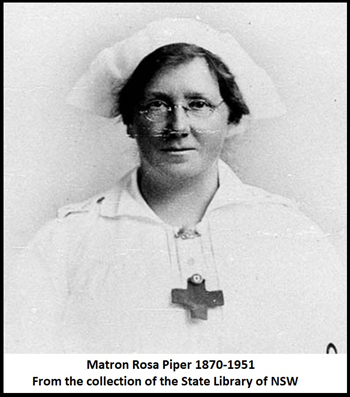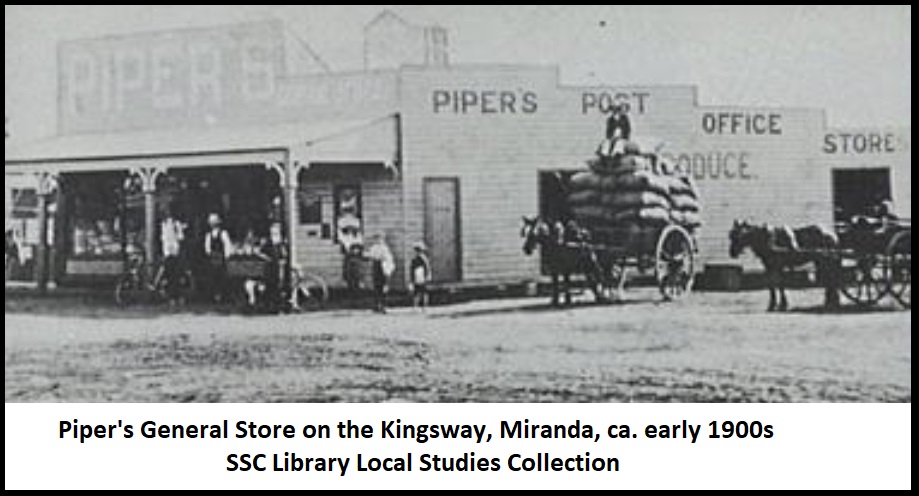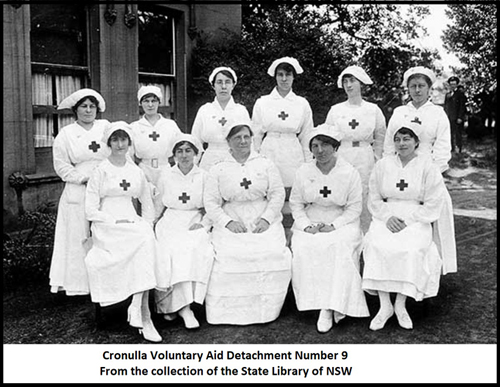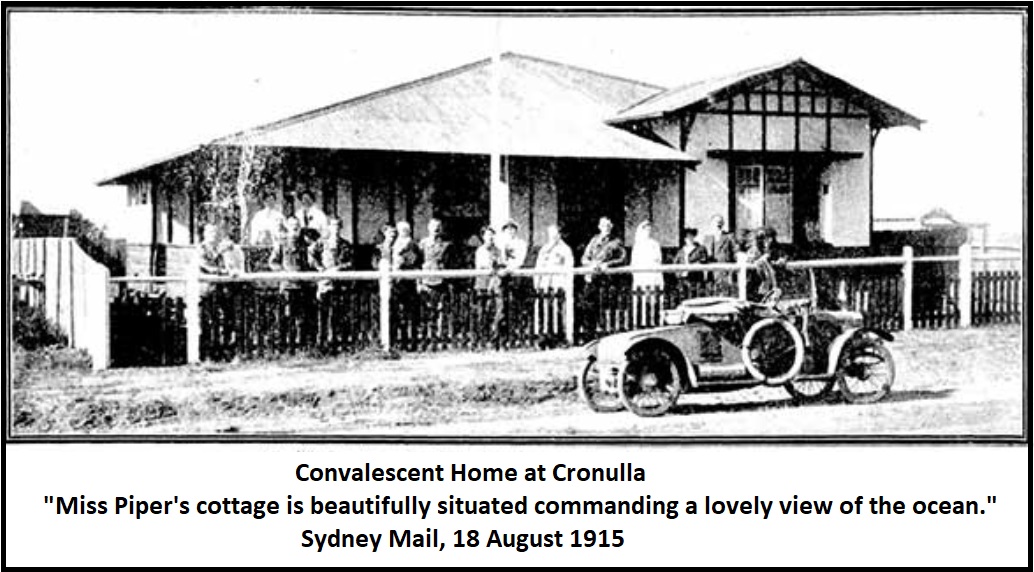

| Welcome | Database | Indexes | Copyright/Disclaimer | Login |
Rosa Elizabeth PIPER, MBE 1870-1951

Red Cross Society Commandant and charity worker
Rosa Elizabeth Piper was born
in Dungog in 1870, the daughter of James Piper and his wife, Elizabeth nee
Allender. Rosa grew up in a family devoted to the Methodist Church and involved
in community affairs and charitable works.
After selling his Dungog store to his son
Edward, Rosa’s father bought a candle and soap making business in Tamworth where
he became a prominent citizen and was elected Mayor on two occasions.
James Piper died in 1897 and
his wife Elizabeth in 1908. At the time of Elizabeth’s death, all her daughters
except Rosa were married and her son, Charles Thomas, had taken over the
business assisted by Andrew John Telfer, the husband of his sister May Eliza. He
later became Mayor of Tamworth.
Rosa’s brother, Edward, sold
the Dungog store in 1907, moved to the Sutherland Shire and set up Piper’s store
in Miranda. The area was becoming popular with many of the Methodist faith as a
holiday destination and some had purchased property to settle permanently.
Probably influenced by her brother, Rosa by about 1913 was living in Cronulla.

Shortly after war broke out in 1914, the Australian Red
Cross Society was formed and local districts were encouraged to form their own
committees. By the end of August 1914, local women had formed a Red Cross Branch
at Cronulla with Mrs. Kathleen Vennard as President, Miss Rosa E Piper, Hon.
Secretary and Mrs. Windsor, Hon. Treasurer. In the next months the group raised
funds for Red Cross purposes, sewed and knitted items of clothing sent overseas,
and raised funds to provide a travelling kitchen for soldiers at the front. It
was marked with the name ‘Cronulla and District, N.S.W.’ and allotted to 17th
Australian Infantry Battalion.
After the horrendous casualties of the Gallipoli
campaign, many women wanted to be involved in more significent service and the
Voluntary Aid Detachment (VAD) scheme was formally established. Its purpose was
to assist in the care of sick and wounded personnel through Red Cross organised
channels. They were restricted from serving overseas by the Defence Council.
Each detachment had a commandant who was either a
trained nurse or eligible for membership of the Australian Trained Nurses
Association, a doctor and about 20 men or women. Each member had to hold a First
Aid or Home Nursing Certificate or obtain these qualification within 6 months of
their enrolment. When Rosa was growing up in Tamworth, her father, James Piper,
was an influential member of the hospital committee and she may have had some
appropriate training for her charity work. Early in 1915, under Rosa Piper as
Commandant and Dr. William Sproule as lecturer, the Cronulla Voluntary Aid
Detachment (No.9) began their St.John Ambulance First Aid training.

In June 1915 NSW Premier Holman announced that wounded
soldiers from the Dardanelles were on their way home to Australia and the
Cronulla Red Cross Society was asked by the Executive of the Red Cross if they
could accommodate and care for some of the returning men. After a public meeting
in the Shire, offers of assistance poured in but at first finding suitable
accommodation was difficult. Miss Piper offered her home and another who
volunteered was Mr.Justice George Rich who offered ‘Ryther’ his cottage at
Cronulla for care of wounded soldiers. In May 1915 Justice Rich had received
news of the death of his son in battle in Flanders and this may have influenced
his decision.
On 20 July 1915, the Cronulla Convalescent Home was
officially opened by Dr Sproule with Rosa Piper appointed as Matron. The first
Red Cross flag to fly over a Convalescent Home in New South Wales was raised.
The facility could accommodate up to ten recuperating soldiers in large airy
rooms and had spacious verandahs.
The ‘Kyarra’ had already arrived in Sydney with 37
wounded soldiers and 441 medical cases and after assessment at Randwick six of
these men were sent to the home at Cronulla. Word soon got back about the
beachside home and many sick and wounded soldiers were asking to be sent there.
From 2 August 1915 through to the end of 1916, 133 men were cared for at the
Cronulla convalescent Home. Dr. William Sproule provided medical care for the
soldiers and instruction to the VADs and Mr. Arthur Finch offered his services
as both chemist and dentist free of charge.

By March 1916 there were 11 Red Cross convalescent homes
in New South Wales caring for over 200 men. In August 1917, the Propeller
reported that the Cronulla home had been closed down. After the Gallipoli
campaign most of the Australian troops had been shifted from Egypt to France.
Sick and wounded Australian soldiers were being sent to England for care and
treatment. The members of the Cronulla Aid Detachment continued their work
supporting the Red Cross, travelling to country convalescent homes and taking
part in major fundraising events. With many of their members serving overseas,
the captain of the Cronulla Surf Life Saving Club, Frank Stroud, trained the
VADs in rescue and resuscitation and they were rostered for duty on the beach in
case of emergency.
Rosa Piper continued her work with the Red Cross as
relieving matron at convalescent homes at Rose Hall, Woolwich and Wentworth
Falls and was in control of the VAD hostel at Randwick. In 1920 she moved to Red
Cross headquarters and was appointed as honorary director of the After Care
department for soldiers and their dependants and honorary director of the VADs.
She became Honorary Senior Commandant of the NSW Red Cross and in 1935 was
awarded an MBE for her charity work and her work with the Red Cross. The next
year she was one of six people to receive the Honorary Long Service Medal.
Rosa Piper moved to 17 Essex Street in Epping and died
on 27 February 1951. After a funeral service at St. Alban’s Anglican Church,
Epping, the cortege moved to the Northern Suburbs Crematorium. She was the last
surviving child of James Piper of Tamworth.
Click on the name Rosa Elizabeth PIPER at the heading of
this story to be taken to her entry in the database.
Colleen Passfield 2019
References:
NSW BDM
Ancestry
Wikipedia
Woronora Cemetery
Service and Sacrifice – Marilyn Handley and Susanne
Hewitt
Ryerson Index
Find a Grave
The Cronulla Story – Gary Lester
Trove Newspapers
SMH
The Propellor
Dungog Chronicle
Tamworth Daily Observer
The Methodist (Sydney, NSW, 1892-1954)
Sutherland Shire Library/ Local History/ First World
War Home Front Volunteers by Stephanie Bailey